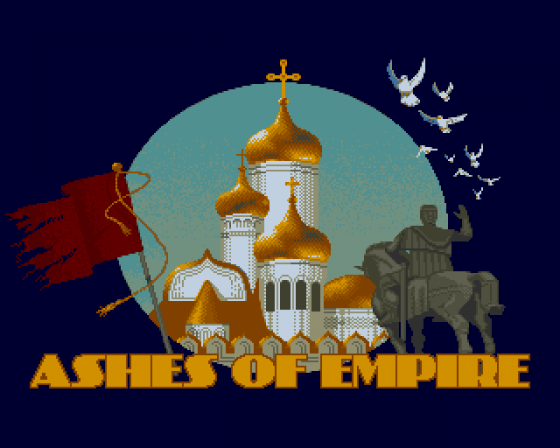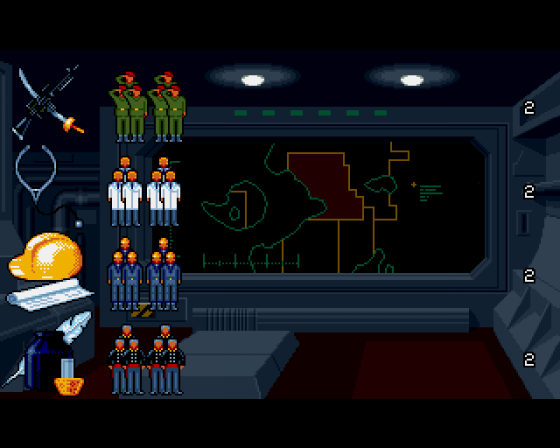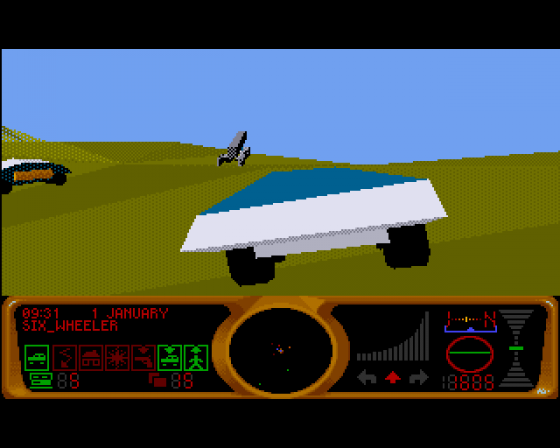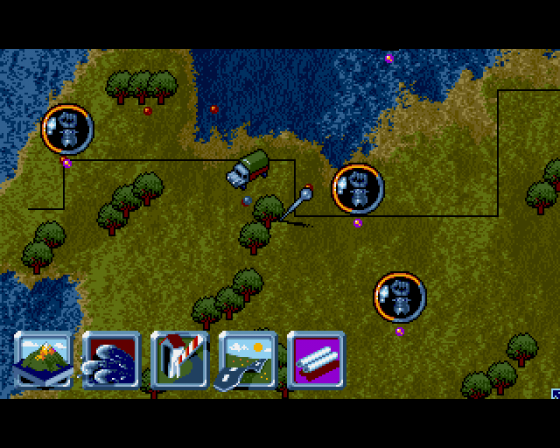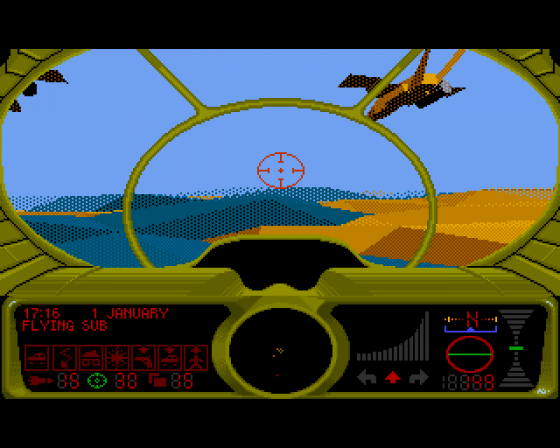
Amiga Power
 1st August 1992
1st August 1992
Categories: Review: Software
Author: Richard Longhurst
Publisher: Mirage
Machine: Amiga 500
Published in Amiga Power #16
Is it a game or is it a political simulation? Mike Singleton attempts to increase the peace with his latest creation
Ashes Of Empire
Okay. So what are we all here for? A quick flick through Ashes' manual reveals a message from the United Communities Special Directive. "The purpose of your highly sensitive and difficult commission is to bring peace, economic stability, ethnic harmony and democratic freedom to the troubled provinces and republics of the Confederation of Syndicalist Republics (CSR)." Oh. And I thought I was going to play a computer game.
Leaving the issue of whether or not Ashes Of Empire really is a game to one side, there are several other questions that need to be answered, such as "how do we go about this seemingly impossible task?" Generations of Soviet politicians haven't managed to do it in 80 years, so what hope have we got using an Amiga and a few floppy disks? A lengthly flick through the rest of the manual reveals the answer Ashes Of Empire hinges around a complex web of character interaction and strategy.
You start the game in a coastal province, and gradually move inland, making friends with absolutely everyone you meet, and gathering the resources that will enable you to continue the fight for peace. If you succeed, the entire CSR will be pacified in one enormous hallucinogenic trance. If your peace, keeping mission fails, the CSR's republics will be doomed to nuke each other to bits in a series of futile disputes over borders and any other trifles that dominate the television news.

Despite the monstrous putting-the-world-to-rights-in-one-fell-swoop scenario. Ashes Of Empire is remarkably easy to play. The game essentially falls into two sections. The action part involves moving from place to place across a Midwinter-style fractally generated landscape, and, more often than not, getting involved in a fight along the way. And, when you reach your destination, the strategy side is based around what has to be done to achieve the goals for pacifying a particular province.
The strategy aspects of the game are the most challenging and enjoyable. To pacify a republic, a certain number of provinces in the republic also have to be pacified within a set time limit. To do this, you have to satisfy four United Communities criteria, which are as follows - to provide a set number of special buildings, to demolish buildings that threaten the province's harmony (night clubs, water-pistol factories and Ruby Wax's house probably fall into this category), to eliminate CSR military units, and to secure the support of the different ethnic groups in the province. Sounds like a piece of cake, doesn't it?
Taken en bloc, the game's objectives sound daunting, but any fears are soon allayed by the way the plot develops. From an early meeting, for example with a nurse in a hospital, it's easy to build up a network of contacts that can lead you to important provincial politicians. And at the same time, you can collect resources that can be used to achieve each of the objectives. To a certain extent, several goals can be achieved simultaneously, simply through the single-minded pursuit of one of the game's main characters.

The path you take through the game largely depends on the people who are persuaded to join your cause, and the buildings they are in charge of. Different buildings supply different resources, so if the politician in Shinkv demands huge amounts of gold in return for his co-operation, you'd better find a vault. But if it's food and wine he's after, a farm house will have to be commandeered in the name of peace. The strategy side of the game soon becomes very absorbing and it's hard not to get totally obsessed with providing what the province really needs. But the intensity of the strategy is broken by the unavoidable 3D travelling. Your operation can't be controlled from one place, because to recruit people, you have to meet them face to face. The strong presence of CSR troops invariably leads to some form of 3D combat, which means it just takes longer to get around. The combat is fun at first, but the polygon landscape isn't entirely convincing, and even though a wide variety of craft is available, they all seem to have the same handling characteristics. If the screen border didn't change, it would be hard to tell whether you were on a motorbike or in an armoured car. The vehicles also all have the unnervingly unrealistic ability to spin around on the spot.
For a game which is based so much on realism in the strategy side, it's a real let down to have to slog through a flimsy gung-ho simulation just to travel around. An optional 3D section would have kept the action addicts happy, and would have let the rest of us get on with the serious business of saving the CSR. Mike Singleton, the game's designer, seems to have learnt from criticisms of his Midwinter games, which provided huge worlds, but they were filled with very little detail. Ashes is positively brimming with towns, people and enemies, but the 3D system is still unsatisfactory.
If it all sounds terribly complicated, that's because it is. As game scenarios go, this must be one of the most wide-ranging sagas ever to grace a computer's memory chips. If you thought War and Peace was a long book, just wait until you see the background material supplied with Ashes Of Empire. Every single province, of which there are more than 40, is described in mind-boggling detail. Mike Singleton suggests that the player read each and every one of these diatribes, but while you're poring over the details of 42 semi-fictional states, there's a strange feeling at the back of your mind that once upon a time, you used to know what daylight looked like and that you also used have a life.
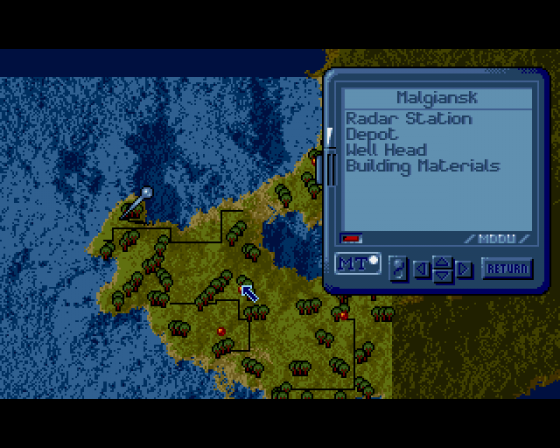
Don't get me wrong. I'm all for realism, atmosphere and background detail, but with its pie charts and socio-economic, politico-ethnic breakdowns, Ashes takes it all far too seriously. Hell, this is supposed to be a game, not an ACME Universal Political Simulator of the break-down of the Soviet Union.
Going Through It In Steppes
But wait a minute. Perhaps that's what it is all about. Mike Singleton makes no secret of the fact that the game's CSR is the USSR, and that Ossia is Russia, so perhaps it's not a game after all. The 3D action elements are definitely game-like, but the underlying themes and strategies are inescapably based on real life, which inevitably leads to the conclusion that in Ashes Of Empire, Mike Singleton is trying to do more than entertain the game-playing masses.
He's trying to educate us, to let us know that not everything is going swimmingly in the CIS. That we should be aware of what's going on in a potentially disastrous situation on the other side of the world. I'm sure people will argue that a computer game isn't the place to broach such ideas. But the interactive, involving environment that a computer game provides is a far better way to learn than vegetating in front of News at Ten.

Ashes Of Empire is enjoyable to play but it's obviously not the same sort of fun you'll get from half an hour with Lemmings or Parasol Stars. Ashes provides a unusual cerebral challenge, combined with the sort of detective work that even Sherlock Holmes would be proud of. If you're after some fast action and a quick laugh, don't even think about buying Ashes Of Empire. But if you want a game that will keep you going long into the night a game that will test your brains as much as your stamina, then Ashes is definitely the one for you.
The Bottom Line
Uppers: Vast strategy/role playing epic provides hours of playing time like no other game can. Compulsive character interaction and strategy development provides an addictive challenge.
Downers: The 3D action scenes, while fun at first, become a chore to play later on. Yes, they look great and move fast, but they don't really fit in with the strategy side of the game.
Even though Ashes is a complicated game, it's surprisingly easy to get to grips with it. There's plenty of gripping gameplay waiting to be discovered, but there's also a nagging feeling that it's not quite as much fun as it should be.


